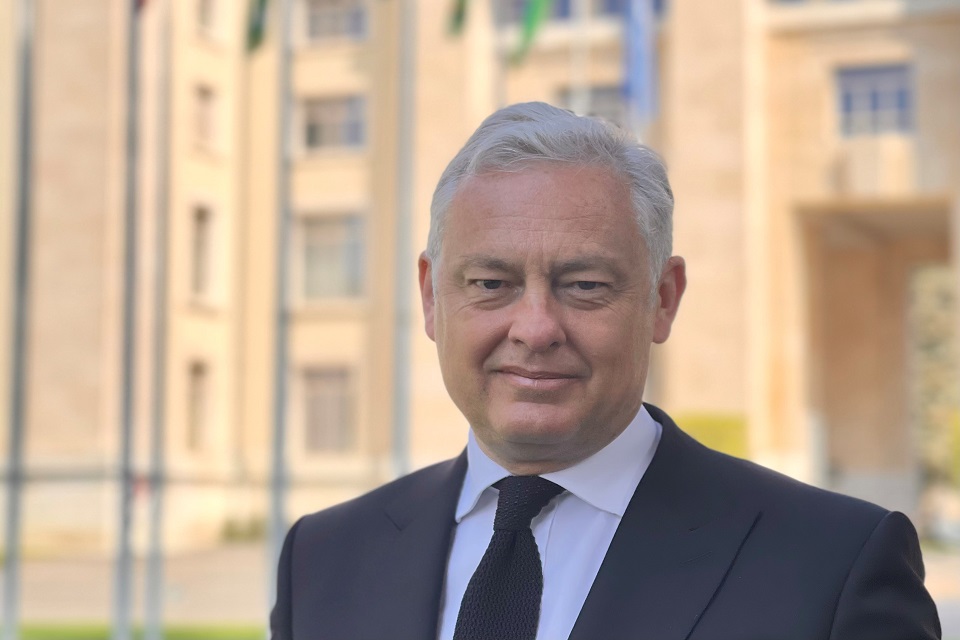WTO Trade Policy Review of the Republic of Korea: UK Statement
The UK's Ambassador to the WTO and UN in Geneva, Simon Manley, delivered this statement at the WTO Trade Policy Review of the Republic of Korea on 13 October 2021.

Thank you Chair. Let me join others in welcoming Jeongil KIM, Deputy Minister for International Trade and Legal Affairs and his team from the Republic of Korea and express our gratitude to his Government and to the WTO Secretariat for their respective reports. Let me also thank you, Chair, and our distinguished discussant, Mathias Francke, for facilitating this Trade Policy Review and his insightful comments.
Chair, it is a pleasure to attend a Trade Policy Review of one of the United Kingdom’s most valued and like-minded trading partners.
The Republic of Korea is one of the great success stories of the international trading system; the first country to transition from aid-recipient to aid donor. As Trade Minister Yeo expressed in a recent presentation here in Geneva, and also during a session at this year’s Public Forum, Korea’s experience provides valuable lessons on the role of trade in achieving a country’s development goals. We heard from Minister Yeo recently on Korea’s national experience in becoming a trading nation, and the numbers are here to illustrate this success story: Korea ranks as the world’s 7th largest exporter, and the 9th in terms of world trade, a testimony of its robust participation in the multilateral trading system. The United Kingdom welcomes Korea’s strong contribution to the WTO, its deep expertise and its ability to work collaboratively and pragmatically with Members. Including ourselves, of course.
Chair, the United Kingdom and the Republic of Korea share close economic ties. Despite the pandemic, Korea remains one of our top five trading partners in Asia Pacific, with bilateral trade between our countries totalling over £11 billion in 2020. This year, we also celebrate the successful implementation of our bilateral FTA, and the UK looks forward to starting work to upgrade and enhance this agreement before the end of 2022. It is our view that there is significant potential to grow trade between our two countries in areas such as digital trade, a priority for the UK in the Asia Pacific region, where technological innovation and the digital economy are growing exponentially. We were pleased to see the strategic importance Korea places on these sectors as well, another indicator of our alignment.
Korea’s hard-working WTO team, led by our distinguished colleague, Ambassador Lee, should be proud of their contributions during this reporting period. We have witnessed Korea’s active participation across different files in the WTO and covering a wide-range of issues, which others before me have mentioned. We value Korea’s valuable engagement in the plurilateral Joint Statement Initiatives, and look forward to working closely together to modernise the WTO Rulebook to make it fit for the third decade of the 21st century. Services, digital, trade and development, trade and health and trade and the environment, all these areas are ripe for discussion and we look forward to continuing to collaborate with Korea on these (and other) agendas in this Organization. On that note, we would also like to recognise Korea’s contribution to the ongoing work on WTO reform as a fellow member of the Ottawa Group.
The UK has engaged closely with this TPR, which is a signal of the diverse and highly integrated nature of our trading relationship. I would like to touch on three areas of particular interest to us.
Firstly, we commend Korea’s decision in October 2019 to forgo access to Special and Differential treatment in current and future WTO negotiations. This is an example of a Member taking on commitments commensurate with their current level of economic development, and is in line with Korea’s remarkable journey to become the economic leader it is today. We encourage Korea to continue to serve as an example to other countries seeking greater levels of economic development, particularly regarding market access for agricultural goods.
Secondly, financial services is a major area of trade between our two countries, and we welcome steps to facilitate businesses operating in this sector. Financial services is a dynamic sector, benefiting from the growth of fin-tech and new technologies. We are particularly interested in how Korea will utilise these technologies as part of the country’s “innovation-led growth strategy”, as a common theme underpinning Korea’s policies through the reporting period. We have posed several questions in regard to these issues and thank our Korean friends for their responses.
Lastly, as COP26 President, we warmly welcome Korea’s efforts to reduce emissions. We look forward to Korea’s announcement of a revised Nationally Determined Commitment on emissions reductions at Glasgow, consistent with the 2050 Net Zero ambition. We encourage Korea to strive for the highest possible climate ambition, in-line with the recommendation of the IPCC that global emissions must halve, by 2030, in order to limit global warming to 1.5 degrees Celsius. It is our view that trade policy is an essential tool in achieving this objective, and we trust it shall form a central component in Korea’s Green New Deal. We were pleased to see so many references to Korea’s Green New Deal strategy today and the emphasis Korea places on this transition, and thus in view of COP26 we encourage Korea’s active cooperation with partners to meet its ambitious climate commitments, particularly when decarbonising the economy.
In closing, Chair, I thank our Korean friends for their positive engagement, their responses to our questions, and for their positive role and critical leadership in strengthening the multilateral trading system. I wish them a successful Trade Policy Review, and look forward to working closely together as we seek to reform and revitalise the WTO and enhance our already strong bilateral trade relationship.